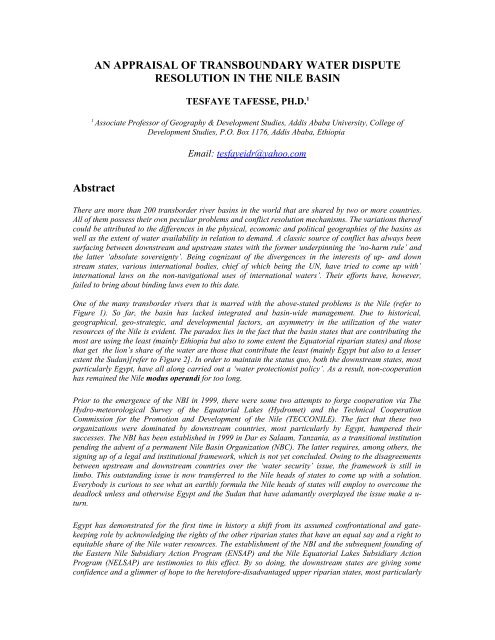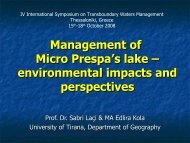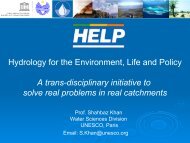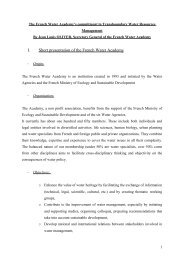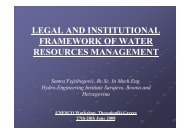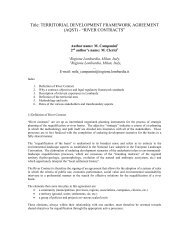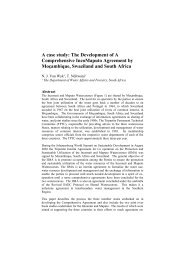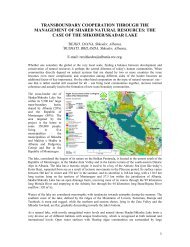An Appraisal of Shared Water Dispute Resolution ... - inweb
An Appraisal of Shared Water Dispute Resolution ... - inweb
An Appraisal of Shared Water Dispute Resolution ... - inweb
Create successful ePaper yourself
Turn your PDF publications into a flip-book with our unique Google optimized e-Paper software.
AN APPRAISAL OF TRANSBOUNDARY WATER DISPUTE<br />
RESOLUTION IN THE NILE BASIN<br />
TESFAYE TAFESSE, PH.D. 1<br />
1<br />
Associate Pr<strong>of</strong>essor <strong>of</strong> Geography & Development Studies, Addis Ababa University, College <strong>of</strong><br />
Development Studies, P.O. Box 1176, Addis Ababa, Ethiopia<br />
Email: tesfayeidr@yahoo.com<br />
Abstract<br />
There are more than 200 transborder river basins in the world that are shared by two or more countries.<br />
All <strong>of</strong> them possess their own peculiar problems and conflict resolution mechanisms. The variations there<strong>of</strong><br />
could be attributed to the differences in the physical, economic and political geographies <strong>of</strong> the basins as<br />
well as the extent <strong>of</strong> water availability in relation to demand. A classic source <strong>of</strong> conflict has always been<br />
surfacing between downstream and upstream states with the former underpinning the ‘no-harm rule’ and<br />
the latter ‘absolute sovereignty’. Being cognizant <strong>of</strong> the divergences in the interests <strong>of</strong> up- and down<br />
stream states, various international bodies, chief <strong>of</strong> which being the UN, have tried to come up with’<br />
international laws on the non-navigational uses <strong>of</strong> international waters’. Their efforts have, however,<br />
failed to bring about binding laws even to this date.<br />
One <strong>of</strong> the many transborder rivers that is marred with the above-stated problems is the Nile (refer to<br />
Figure 1). So far, the basin has lacked integrated and basin-wide management. Due to historical,<br />
geographical, geo-strategic, and developmental factors, an asymmetry in the utilization <strong>of</strong> the water<br />
resources <strong>of</strong> the Nile is evident. The paradox lies in the fact that the basin states that are contributing the<br />
most are using the least (mainly Ethiopia but also to some extent the Equatorial riparian states) and those<br />
that get the lion’s share <strong>of</strong> the water are those that contribute the least (mainly Egypt but also to a lesser<br />
extent the Sudan)[refer to Figure 2]. In order to maintain the status quo, both the downstream states, most<br />
particularly Egypt, have all along carried out a ‘water protectionist policy’. As a result, non-cooperation<br />
has remained the Nile modus operandi for too long.<br />
Prior to the emergence <strong>of</strong> the NBI in 1999, there were some two attempts to forge cooperation via The<br />
Hydro-meteorological Survey <strong>of</strong> the Equatorial Lakes (Hydromet) and the Technical Cooperation<br />
Commission for the Promotion and Development <strong>of</strong> the Nile (TECCONILE). The fact that these two<br />
organizations were dominated by downstream countries, most particularly by Egypt, hampered their<br />
successes. The NBI has been established in 1999 in Dar es Salaam, Tanzania, as a transitional institution<br />
pending the advent <strong>of</strong> a permanent Nile Basin Organization (NBC). The latter requires, among others, the<br />
signing up <strong>of</strong> a legal and institutional framework, which is not yet concluded. Owing to the disagreements<br />
between upstream and downstream countries over the ‘water security’ issue, the framework is still in<br />
limbo. This outstanding issue is now transferred to the Nile heads <strong>of</strong> states to come up with a solution.<br />
Everybody is curious to see what an earthly formula the Nile heads <strong>of</strong> states will employ to overcome the<br />
deadlock unless and otherwise Egypt and the Sudan that have adamantly overplayed the issue make a u-<br />
turn.<br />
Egypt has demonstrated for the first time in history a shift from its assumed confrontational and gatekeeping<br />
role by acknowledging the rights <strong>of</strong> the other riparian states that have an equal say and a right to<br />
equitable share <strong>of</strong> the Nile water resources. The establishment <strong>of</strong> the NBI and the subsequent founding <strong>of</strong><br />
the Eastern Nile Subsidiary Action Program (ENSAP) and the Nile Equatorial Lakes Subsidiary Action<br />
Program (NELSAP) are testimonies to this effect. By so doing, the downstream states are giving some<br />
confidence and a glimmer <strong>of</strong> hope to the heret<strong>of</strong>ore-disadvantaged upper riparian states, most particularly
Ethiopia. If this attempt is further strengthened, there is a good possibility <strong>of</strong> untying, if not breaking, the<br />
stalemate. In the opinion <strong>of</strong> the author, three factors are responsible for the change <strong>of</strong> heart and minds by<br />
the Egyptians: (a) the pressure from the Third Parties, such as the World Bank and UNDP, to cooperate,<br />
(N.B. the World Bank played a central role in the establishment <strong>of</strong> the NBI), (b) the threats from upstream<br />
riparian states, particularly Ethiopia, to harness the Nile waters unilaterally (c) the appointment <strong>of</strong> a wise,<br />
well-experienced and pragmatic Minster <strong>of</strong> <strong>Water</strong> in Egypt, Mr. Abu Zeid, who has made lots <strong>of</strong> efforts in<br />
changing the attitudes <strong>of</strong> hard-core elements in Egypt.<br />
The NBI and ENTRO have created platforms for discussions and dialogues. In effect, the tense relations<br />
between upstream and downstream countries have eased in the past one decade. This doesn’t however<br />
mean that they have a rosy relationship. In spite <strong>of</strong> the presence <strong>of</strong> a basin-wide forum, i.e. NBI, and some<br />
strides made in one or the other basin-wide projects, the Egyptians seem to stick to their water security<br />
policy and the adoration <strong>of</strong> the status quo. Unless there is a change <strong>of</strong> heart and mind on these sticking<br />
issues, it becomes very difficult to build confidence and trust between Ethiopia and Egypt. Be that as it<br />
may, the fact that there is a Nile-based Organization in Entebbe, Uganda is by itself a virtue and a plus on<br />
the balance sheet. The establishment <strong>of</strong> the NBI has also kindled some hope for the poor folks inhabiting<br />
the basin with expectations to improve their well-being through irrigation agriculture, watershed<br />
management and access to power. The other added advantage <strong>of</strong> the NBI is its creation <strong>of</strong> employment<br />
opportunities for many basin-based pr<strong>of</strong>essionals. The NBI and its affiliates have also funded a number <strong>of</strong><br />
studies on socio-economics, hydrology, institutions and water technology. As a result, quiet a sizeable<br />
number <strong>of</strong> valuable research outputs have been produced and published.<br />
The rationale behind the establishment <strong>of</strong> the Eastern Nile Technical Regional Office (ENTRO) is to come<br />
up with concrete transboundary or in-country projects in the Eastern Nile, i.e. in Egypt, Ethiopia and the<br />
Sudan. ENTRO is preparing a number <strong>of</strong> projects related to watershed management, power production<br />
and pool, irrigation and what they call ‘Joint Multipurpose Projects’. The latest information the author has<br />
about the projects is that some are at the pre-feasibility stage, others at feasibility and some more at the<br />
design stage. The power pool deal between Ethiopia and the Sudan seems to be on the right track while for<br />
unknown reason the much awaited Baro-Akobo Multipurpose Project is derailed. Dam sites within<br />
Ethiopia have also been identified, e.g. at Koga, to irrigate 7000 hectares <strong>of</strong> land and to improve<br />
watershed management on 22,000 hectares catchment area. Sadly, this dam that was scheduled to be<br />
completed by November 2006 and to supply irrigation water by the end <strong>of</strong> January 2007 is not yet<br />
completed. According to some sources, currently only 90% <strong>of</strong> the dam works and 15% <strong>of</strong> the irrigation and<br />
drainage infrastructure are complete. Best estimates indicate that the dam construction will not be<br />
completed before March 2009 and the irrigation and drainage infrastructure before 2011.<br />
The major problem bedeviling the NBI and ENTRO is the immense time it is taking to translate plans and<br />
projects on the ground. So far, one could see little or nothing on the ground. This is adding frustration not<br />
only to the impoverished people living in the hitherto disadvantaged countries like Ethiopia but also to<br />
elites and skeptics alike. Everybody knows that hydraulic projects require quite a significant time to get<br />
grounded. However, it is inconceivable and unbearable to see little or nothing coming out <strong>of</strong> the NBI in the<br />
past ten years and from ENTRO in the past seven years. The picture will become complete if one adds the<br />
failure to come up with a permanent institution through the ratification <strong>of</strong> the Legal and Institutional<br />
Framework that started way back in 1997. Such a lacuna begs a number <strong>of</strong> questions: Is the NBI and its<br />
<strong>of</strong>fshoots, ENTRO, NELSAP, time-buying exercises? Why are the Egyptians still adamant when it comes to<br />
rescinding their water security policies? Why are they still considering the colonially-induced Treaty <strong>of</strong><br />
1929 and the bilateral treaty they made with the Sudan in 1959 as sacrosanct?<br />
The catch-word ‘win-win’ is easier said than done. It clings good to the ear but complicated to translate it<br />
into realty. How can upstream states think <strong>of</strong> ‘win-win’ under a situation where (a) the Egyptians are<br />
interested to get their water quota from the Nile based on the 1959 Agreement in an uninterrupted manner<br />
(55.5 billion m3/year), (b) the Egyptian ‘water security’ policy remains intact through the maintenance <strong>of</strong><br />
the status quo ante, (c) the out-<strong>of</strong>-basin transfers at Toshka and El-Salaam canals are either operational or<br />
on-going. It is incumbent upon the Egyptians to revise or annul these age-old positions if we aspire to<br />
create ‘win-win situations’ in the basin. In addition, no specific methodology has been developed to<br />
quantify benefits and costs in the utilization <strong>of</strong> Nile water resources. Neither is it easy to develop a benefit<br />
2
sharing model. The NBI has now hired international consultants who are expected to come up with a<br />
benefit sharing methodology or model by considering the objective realities and the historical context<br />
prevailing in the basin.<br />
The author <strong>of</strong> this paper feels that the position in the Nile Basin for some time to come should not be ‘winwin’<br />
but rather ‘lose-win’. The unilateral users <strong>of</strong> the Nile, mainly Egypt but also to some extent The<br />
Sudan, should rescind their monopoly by compromising some <strong>of</strong> their national interests in order to bring<br />
the hitherto disadvantaged upstream states on board. This requires, inter alia, willingness to relinquish<br />
some <strong>of</strong> their water shares for the benefit <strong>of</strong> the upstream states, looking for alternative water sources<br />
other than the Nile (e.g. exploring groundwater aquifer potentials) and partial dependence on ‘virtual<br />
water’. It is the conviction <strong>of</strong> the author to suggest that the solutions in the Nile could be found if the<br />
downstream states prepare themselves for a ‘lose-win’ solution in the short-term which could bring about<br />
a ‘win-win’ solution in the long-term.<br />
References<br />
Abdalla, Seifedin, (2000), “The Nile Basin: Century <strong>of</strong> Cooperation”, paper presented at the 8 th Nile 2002<br />
Conference, Addis Ababa, Ethiopia, June 23-30.<br />
Addis Zemen Online (06 April, 2001), “The Nile Basin Countries Meeting gave Priority to the<br />
Implementation <strong>of</strong> ten Projects”, cited in http://enh.ethiopiaonline.net/<br />
Allan, <strong>An</strong>thony J., (1990). The Nile Basin: Evolving Approaches to the Nile <strong>Water</strong>s Agreement.<br />
Occasional Paper 20, School <strong>of</strong> Oriental and African Studies (SOAS) <strong>Water</strong> Issues Group.<br />
Arabic News Online, (14 March, 2001), “Ethiopian Projects on the Nile Ruled Out”, cited in<br />
http://www.arabicnews.com/<br />
Bram, (15 March, 2000), “Nile Basin Nations Move Towards Cooperation”, cited in<br />
http://www.oneworld.org/<br />
Collins, Robert, O., (2000), “In Search <strong>of</strong> Nile waters, 1900-2000” in Erlich, H. & Gershoni, I. (eds.). The<br />
Nile: Histories, Cultures, Myths. London: Lynne Rienner Publishers.<br />
Grey, D. and Claudia W. Sad<strong>of</strong>f (2007), “Sink or Swim? <strong>Water</strong> Security for Growth and Development”,<br />
<strong>Water</strong> Policy 9, pp. 545-571.<br />
Elhance, Arun P, (1999). Hydropolitics in the Third World: Conflict and Cooperation in International River<br />
Basins. Washington D.C.: United States Institute <strong>of</strong> Peace Press.<br />
Erlich, H. and Gershoni, I., (2000). The Nile: Histories, Cultures and Myths. London: Lynne Rienner<br />
Publishers.<br />
Fischer, C. (2005). Review <strong>of</strong> International Experience with Benefit Sharing Instruments. A Report for the<br />
World Bank, Southeast Asia Division.<br />
Kagawanja. P. (2007), “Calming the <strong>Water</strong>s: the East African Community and Conflict over the Nile<br />
Resources”, Journal <strong>of</strong> Eastern African Studies, Vol. 1, Issue No. 3, pp. 321-337.<br />
Kamali, G. (2001), “World Bank to finance Nile River Basin Projects”, cited in http://allafrica.com/<br />
Khashef, Abdel-Aziz, (1981), “The Nile – One River and Nine Countries”, Journal <strong>of</strong> Hydrology, 53, pp.<br />
53-71.<br />
Kliot, Nurit, (1994). <strong>Water</strong> Resources and Conflict in the MiddleEast. London: Routledge.<br />
Lonegran, S. & Wolf, A.T., (December 2001), “Moving <strong>Water</strong> to Move People: The Toshka Project in<br />
Egypt”, <strong>Water</strong> International, Vol. 26, No. 4, pp. 589-596.<br />
Negussay Ayele, (1986), "The Blue Nile and Hydropolitics among Egypt, Ethiopia, Sudan", Proceedings<br />
<strong>of</strong><br />
the Ninth International Conference <strong>of</strong> Ethiopian Studies, Moscow, 26-29 August.<br />
Nile Basin Initiative, August 2000 Press Release No. 00/8/11, cited in http://www.nilebasin.org/<br />
Nile-COM (1999). Policy Guidelines for the Nile River Basin Strategic Action Program.<br />
Nile Secretariat Online (03 April, 2001), “Outcomes <strong>of</strong> the Extraordinary Nile Council <strong>of</strong> Ministers<br />
Meeting”, cited in http://www.nilebasin.org<br />
Oejendal, Joakim, (1995), "Mainland Southeast Asia: Co-operation or Conflict over <strong>Water</strong>", in Ohlsson. L.,<br />
(ed.). Hydropolitics: Conflict over <strong>Water</strong> as a Development Constraint. London: Zed Books.<br />
Panel <strong>of</strong> Experts, (10 December 1999). Draft <strong>of</strong> the Cooperative Framework: Revision 2, Entebbe, Uganda.<br />
Sad<strong>of</strong>f, C.W. and David Grey (2002), “Beyond the river: the benefits <strong>of</strong> cooperation on international<br />
3
ivers”, <strong>Water</strong> Policy, 4, pp. 389-403.<br />
Smith, J.M. (1996), “Nine Nations, One Nile”, cited in http://www-personal.umich.edu/<br />
Tesfaye Tafesse (2001a). The Nile Question: Hydrpolitics, Legal Wrangling, Modus Vivendi and<br />
Perspectives. Hamburg/Muenster/London: Lit Verlag.<br />
Tesfaye Tafesse (2001b), “The Hydrpolitical Assessment <strong>of</strong> the Nile question: <strong>An</strong> Ethiopian Perspective”,<br />
<strong>Water</strong> International, Vol. 26, No. 4, pp. 578-588.<br />
Turton, A.R. (2008). Reflections from South Africa on a Possible Benefit-Sharing Paradigm for Transboundary<br />
<strong>Water</strong>s. Paper presented at the First African <strong>Water</strong> Week, Tunis, March 26-28.<br />
UNDP (May 1997). Project Document <strong>of</strong> the Nile Basin Countries.<br />
Walta Information Center (25 May, 2001), “Eastern Nile Riparian Countries to present US $ 569.4 million<br />
worth Projects on the River Course to Creditors and Donors”, cited in http://www.waltainfo.com/<br />
World Bank, (18 March, 1999), “Managing World’s <strong>Water</strong> Resources requires Partnerships, Innovations”,<br />
cited in http://worldbank.org/<br />
Xinhua News Agency Online, (05 April, 2001), "Ethiopia to carry out Irrigation Projects along River Nile",<br />
cited in http://libraray.northernlight.com/<br />
4


